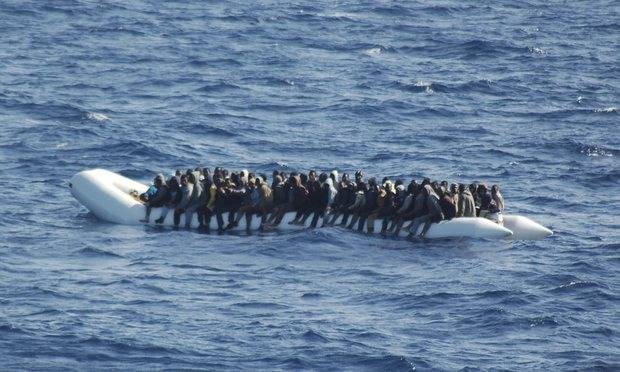David Cameron has pressed EU leaders for more international patrol ships to start turning back boats of refugees as soon as they set off on perilous journeys across the Mediterranean from Libya.
At a European summit on Thursday night the prime minister pushed for a tougher deterrent strategy, similar to the controversial Australian approach of turning away boats containing migrants, as he argued it is essential to destroy the people smugglers’ business model.
Tens of thousands of refugees are picked up in the Mediterranean by rescue boats every year and taken to European countries, but thousands have died during the passage, particularly on the route from north Africa to Italy.
Cameron said the EU rescue mission in the central Mediterranean needs to be expanded so that the international operation’s boats work with the Libyan coastguards to send boats back to Libya.
Cameron is extending the deployment of HMS Enterprise on anti-trafficking operations in the central Mediterranean at least until the summer.
Under Operation Sophia, the international rescue effort in the central Mediterranean, smugglers’ boats are being seized and destroyed, but the mission is operating in international – rather than Libyan – waters.
A UK government source said: “We think Operation Sophia has achieved a lot in terms of bringing the numbers down … but one of the challenges the operation has is that it is still only operating on the high seas.
The source said that at the moment those picked up on the high seas were taken to Italy, but there could be an agreement with the Libyan government to return people.
She said Cameron would also argue that the Nato mission in the Aegean needs to do “more with the Turks so that boats are sent back to Turkey”.
This has begun to happen with the international operation in the eastern Mediterranean, which involves one British ship, but Cameron wants to see “more concrete action”.
“He thinks we should be looking to return people to where they set off from,” the UK source said.
Although Cameron is pressing to deal with the new Libyan government, the move may be met with scepticism given that the regime is a unity administration based out of Tunisia. There are also likely to be human rights concerns about sending back refugees fleeing a country still in turmoil since the UK and allies participated in the removal of Muammar Gaddafi in 2011. Many of those who have undertaken the dangerous journey across the central Mediterranean are seeking refugee status in Europe.
The prime minister warned other leaders that they must not “take their eye off the ball” about the potential for another migrant crisis from Libya to flare up over the summer.
The war-torn country is currently claimed by four different factions: an elected parliament that has been forced out of Tripoli, the Libyan capital; a rebel outfit that now controls Tripoli; aUN-backed administration that was meant to unite the two warring factions but which has been rejected by both; and an Islamic State affiliate that has seized part of the central Libyan coastline, and has a presence in other areas.
Any push-back of refugees would need a viable institutional partner on the Libyan mainland, but none currently exists amid the chaos. The internationally backed government cannot take office in Tripoli for safety reasons and has beenforced to take refuge in neighbouring Tunisia. The two other administrations have previously been reluctant to engage with the west on migration-related military action.
Italian officials have already said that the recent good weather is the main factor behind a spike in migrant crossings from Libya. Some 712 migrants were picked up on Thursday after 2,400 were picked up the two previous days, all grouped in small, flimsy rubber dinghies in international waters near Libya. Three bodies were found during Wednesday’s rescues, conducted mostly by Italian ships.
The UN refugee agency has said 9,800 migrants have arrived in Italy this year up to Wednesday, compared with 7,400 in the same period last year.
Prof Brad Blitz, who researches migration in the southern Mediterranean at Middlesex University, said: “It’s just outrageous. Libya is a country that is divided, which cannot guarantee human rights, which has produced hundreds of thousands of displaced people.
“If the concern is to prevent deaths, as [Cameron] has said, then really he should be promoting safe passage, rather than diverting people so that they have to seek longer and more dangerous routes.”
Courtesy: The Guardian






